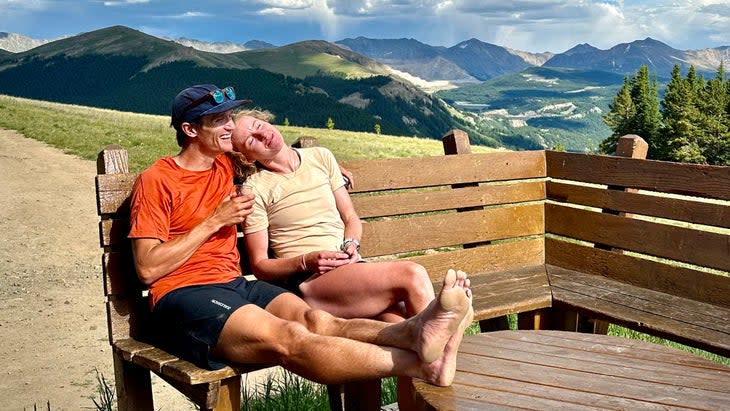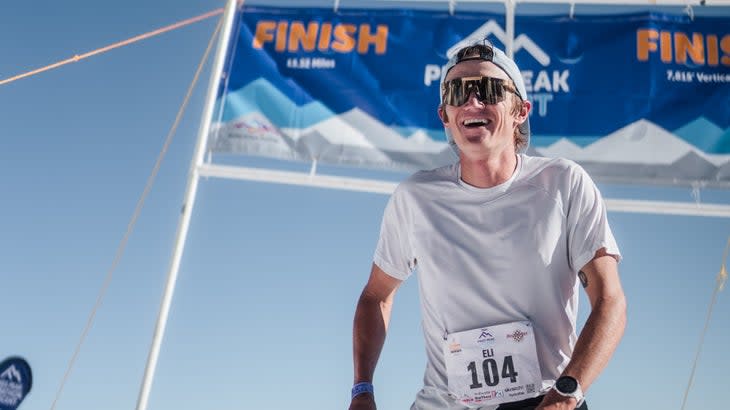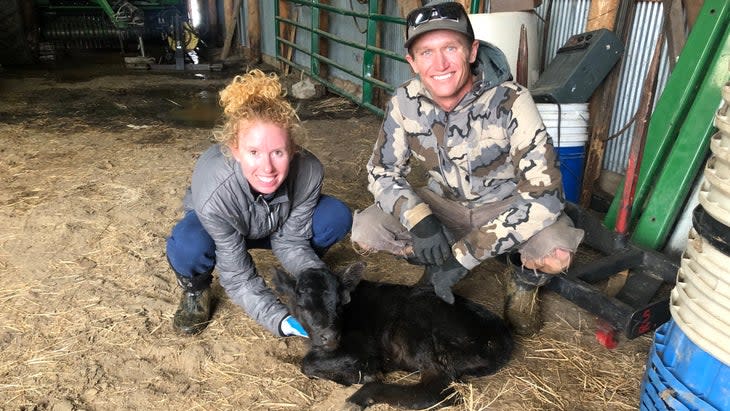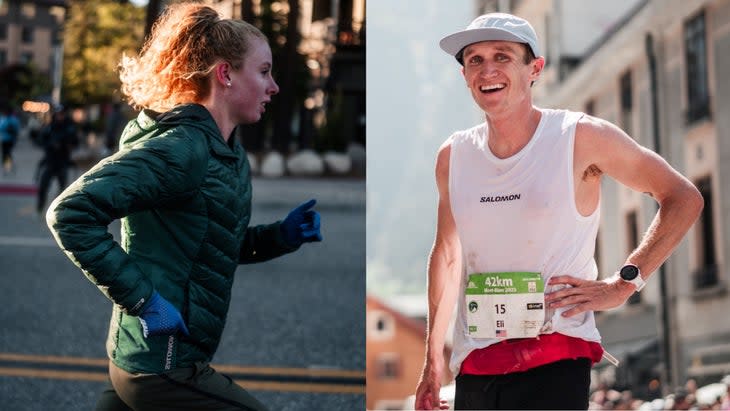Meet the Fastest Trail Running Couple in America
This article originally appeared on Trail Runner
The first time I met Eli and Tabor Hemming, two of America's most exciting "sub-ultra" trail runners right now, they were herding me and several other runners across a highway as if we were cattle.
I had joined a hut-to-hut trip in Colorado this July, guided by trail running legend Rickey Gates. He'd been offering this trip for the past 12 years, and he has a tradition to mark the one-and-only road crossing of the route: everyone has to come up with a fun theme for crossing the road. The quirkier the better.
Previous groups had acted as crabs. Others paired up and wheelbarrowed across. Our group decided that Eli and Tabor would herd everyone across the road as if we were stubborn cows. After all, they aren't only two of the most promising stars in the U.S. trail running scene--they're also ranchers on their family's land near Kremmling, Colorado.

This introduction to the Hemmings made a lasting impression. After joining our group for the rest of the day, the married couple decided to casually run the 10 miles to their car and back home to their 200 head of Black Angus cattle, back to the trails on the family property where they've logged thousands of miles. The Hemmings have honed their unique lifestyle and training regimen to become two of the top runners in the Golden Trail World Series (GTWS) international circuit of short and fast trail races. This week they've stepped away from ranch life to compete in the two-day GTWS Final in Noli, Italy.
Endurance from the Start
Eli and Tabor Hemming started their journeys in endurance sports young. Tabor, now 26, ran cross-country and track in high school. In 2013 and 2014, she competed in the World Trail and Mountain Running Championships as a junior, where she helped Team USA earn a silver medal. Tabor went on to run at the University of Colorado in Boulder, where she contributed to the Buffaloes' 2018 NCAA cross-country championship team and earned All-American accolades.
After college, Tabor turned to trail running, and, in July 2022, won the USATF Mountain Running Championship in Whiteface, New York. This secured her a spot to represent Team USA and compete in last year's World Mountain and Trail Running Championships in Chiang Mai, Thailand.
Eli's endurance started even earlier, when he was seven years old--the age most children learn how to tie their shoes--after his mother started a youth triathlon team in 2003. Eli took to swim-bike-run events and was coached by his mother until he was 19 years old, where he found his way as a professional triathlete for six years. After moving up the ranks and gunning to qualify for the Olympics, he eventually retired from triathlon in May 2021, not due to a lack of discipline, but a lack of inspiration.
"I was unable to do anything else in my life," he told Dylan Bowman on the Freetrail podcast. "There wasn't even any grief there, which was a little scary. It wasn't driving me to happiness."

Eli's expertise in triathlon wasn't Ironman--considered the ultra-distance of triathlon--but rather his expertise was the International Triathlon Union (ITU), or "short-course" triathlons, the faster and more dynamic distances. This speed would translate well to his move from triathlon to "short-course" trail running. In 2021, Eli finished sixth at the USATF Mountain Running Championships at Mount Hood in Oregon, then second in the same race last year, along with a second-place finish at California's Way Too Cool 50K in 3:16:33, three minutes behind ultra-legend Tim Tollefson.
RELATED: The Rise of Shorter and Faster Trail Racing
This June, Eli won the 23K at the Broken Arrow Skyrace in Olympic Valley, California, but perhaps an even more impressive performance was his second-place finish a week later at Mont Blanc Marathon in Chamonix, France, the second stop on the GTWS circuit. He was only a few minutes behind Swiss phenom Remi Bonnet, who currently leads the series after back-to-back victories at Pikes Peak and the Mammoth Trail Festival. Eli currently sits as the fourth-ranked in the men's category for the Golden Trail World Series, the only American in the top 10 of the series going into the finals.
Ranching and Running
For Eli and Tabor, finding their way to the high court of trail running has been anything but conventional. After getting married in 2021, they bought a house in Louisville, Colorado, a suburb near Boulder, but found that, though on paper everything made sense, they weren't happy. Eli was still following his triathlon dreams, while Tabor kept pursuing track goals. The two rarely saw each other.
"We wanted to be anywhere else but there," says Eli. "We are trying to spend as many hours of the day outside as possible, and that setup wasn't working." Quickly, they flipped it 180 degrees, sold their house, and moved into the basement of Tabor's 86-year-old grandmother's house on the family ranch in Kremmling. They've never been happier.

"There are like three trail runners in Kremmling," says Tabor with a laugh, teasing her own hometown located a few hours west of Boulder, with a population of 1,500 people. "My family's been here for five generations," she says. "I snuck away to college, found Eli, got married, and then was like, 'OK, we're coming back up here.'"
Ranching and running trails may sound romantic, but they are quick to mention that it's not always the case. Often, Tabor's dad, nicknamed "Shooter," will walk into their house unannounced, sliding in "like Kramer from Seinfeld" to announce himself. Though privacy may have been forfeited in their relocation, the two have never been more aligned with their values.
"Where we live, you very much disconnect," says Tabor. "We only have Wi-Fi and cell service at the house. As soon as you're 400 meters from our StarLink, there's nothing."

This distance, however, is a welcome barrier between the buzz of scenes like Boulder, a healthy compartmentalization that invites a certain intention. When they're training, they train. When they're on the ranch, it's chores, duties that often double as strength training.
"Right now is firewood season," Eli says. "Yesterday afternoon we were getting truckloads of wood to bring down because we are the wood fetchers." Eli and Tabor will drive an old beater truck into the woods, where Tabor's dad ("Shooter!") chainsaws wood that Tabor and Eli will load, stack, transport, and split...for the whole family.
They also occasionally help out at the Big Shooter coffee and ice cream shop that the family owns in Kremmling. With aging parents and two demanding businesses, the move home was ultimately to support Tabor's family. "I just really didn't want to see that go under for my family," Tabor says. "Running is a time in our life. But the ranch is forever."
As a married couple who lives together, trains together, ranches together, and runs a coaching business together, "Aerobic Monsters," their systems of dialogue and unending patience must be fully intact. And, by all accounts, they are.
"Everything comes down to communication," Eli says. "Our athletic life and our personal life are one and the same. We always talk about things before a [training] session."
RELATED: The Ultimate Guide to Uphill Trail Running
A critical key in their success is to not dwell on things, personally or on the trail. After a training run, they'll take five minutes to debrief, and move on. "If something's bothering us, we say it," says Tabor. "There is danger in assuming the other person knows what you're thinking."
They find a ton of benefit in simply showing up, every day, for each other and for the training session, even if it didn't go as planned. "C's get degrees, is something I always tell my athletes," Eli says.
Tabriz Holtz, 46, is a computer software engineer from Los Gatos, California. She's been coached by the Hemmings for the past two years after experiencing a series of serious health setbacks. Eli and Tabor worked tirelessly, and she slowly moved from a one-minute run, one-minute walk, to a sub two-hour half marathon. "I never thought that was possible. Ever," Holtz says.
"Tabor and Eli bring science-backed, evidence-based encouragement and belief to their coaching," remarked Melissa Kovacs, 50, another one of the Hemmings's athletes. She came to them "a mid-pack road runner beaten down by menopause, and their belief in me pulled me out of a dark place. They literally believe in me more than I believe in me."
The Final Test
Eli and Tabor flew out this week to compete in the GTWS Final held in conjunction with the Iil Golfo Dell'Isola Trail Race in Italy. But that wasn't before the two ran the Kodiak Ultramarathon by UTMB, last weekend in Big Bear, California, to qualify for next year's OCC 55K in Chamonix.
Eli nabbed second place in 3:49:35, while Tabor made her way to the podium, finishing third woman in 4:40:49. After less than a week of rest, they'll be racing the 5K prologue and the 24K mountain race (with 4,500 feet of vertical gain) of the GTWS Final.
Such race stacking might sound crazy, but it's all part of their training strategy. "I don't know if it's mental or if it's actually physical, but it just works really well," says Eli.

"If you think about a taper, you're kind of getting stale," Tabor adds. "That stimulus of elevating lactate even a little helps clear the system. Then, mentally, you're like, 'Oh, I made it to that place and I survived.' You know that place."
What the two seem to prioritize is diversifying their races and having fun, while not being overly committed to one single race or result. "We work toward the race that's coming up and find enjoyment from that," says Tabor. "While not having all our eggs in one basket for the [GTWS] final. Because then, if the plan goes poorly, there goes the whole season."
The Hemmings have become the American darlings of the Golden Trail World Series, the world's leading series of lightning-fast short-course trail races around the world, including crowd favorites like Zegama, Sierre-Zinal, Pikes Peak Ascent, and others, while attracting some incredibly deep fields from the fastest trail runners on the planet.
"What's different about the Golden Trail Series is how it's helping spark a sub-ultra push, especially for athletes like us who are just getting into it but who are trying to compete at the elite level," Eli says. "They're trying to create a college-type feel, organizing it so you feel like you're part of the event."
One of the many friends they've met during their time with Golden Trail World Series is Caitlin Fielder, one of New Zealand's most talented trail and mountain athletes. Fielder, 30, lives and trains in Andorra.
"Before starting the GTWS, I went to races alone, stayed alone, and just kind of kept to myself," says Fielder. "But the GTWS really made me feel like I'm part of a team, forming relationships with people like the Hemmings that would have been harder to create otherwise." She is going into the GTWS ranked seventh in the women's division, with Tabor close behind in 12th place.
But perhaps more than the glory of rankings is what this series has done to bring athletes closer together, to elevate each other's performances through relationships.
"It's just super cool to feel like you're making lifelong friendships built on the foundations of a sport that everyone understands its difficulties and joys," Fielder says. "It's like you're competing to make yourself and your friends better."
The Golden Trail World Series has a total prize purse of about $315,000, which includes $18,000 spread among the top 10 finishers of each race during the season and nearly $8,000 for the finals. While it helps elite runners make a living at their craft, it also creates community.
"You get to live and breathe with them for a week. You're making amazing friendships, seeing how everyone else likes trains, how everybody else lives," adds Tabor. "They try to do a really good job of getting the best in the world together."
The Golden Trail World Series finals will be held from October 19 - 22, and each day's races will be livestreamed here.
For exclusive access to all of our fitness, gear, adventure, and travel stories, plus discounts on trips, events, and gear, sign up for Outside+ today.

